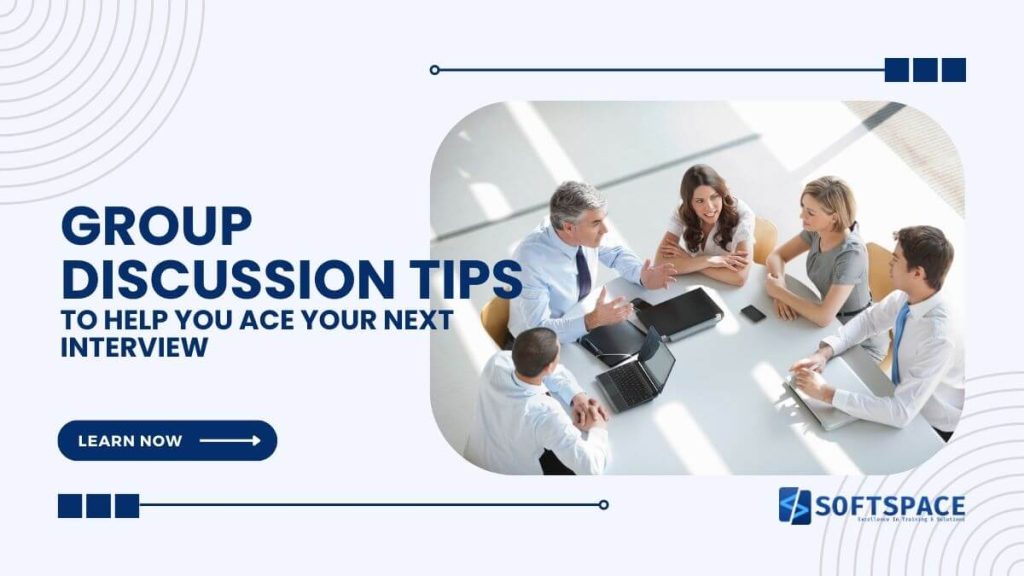Group discussions are an essential part of the selection process for many competitive exams, job interviews, and higher education programs. They help assess a candidate’s communication skills, problem-solving abilities, and team management skills. However, participating in a group discussion can be overwhelming, especially if you’re not used to talking to strangers or expressing your thoughts in a group setting. In this blog, we’ll share some group discussion tips to help you prepare for your next GD and ace it like a pro.
Table of Contents
Understanding the Group discussion format and topics
Before attending a group discussion, it is essential to understand the format, rules, and topic of discussion. You can research the company or institution organizing the GD, study the recent trends and happenings related to the given topic, and gather relevant data and statistics to support your arguments.
You can use keywords such as “Group Discussion tips,” “GD format,” and “GD preparation” to find relevant resources online. Group discussion is an integral part of the interview process. If you also need to understand the tweaks of “How to crack an interview?“, read this blog as well.
Polishing your communication skills
Group discussions require effective communication skills, active listening, and clarity in your thought process. To improve your communication skills, you can read articles related to group discussion tips and topics, practice speaking in front of the mirror, record and listen to your speeches, and participate in group activities such as debates and public speaking contests. You should also avoid using complex vocabulary, slang, or derogatory remarks during the discussion.
Making a good first impression
The first impression is crucial in group discussions. Your body language, attire, and tone of voice play a vital role in conveying your confidence and credibility. You should dress appropriately, arrive early, greet your fellow participants, and maintain eye contact during the discussion. You should also avoid dominating the conversation, interrupting others, or making sarcastic comments.
Being well-prepared for the GD
Preparation is the key to success in group discussions. You should be well-versed in the topic, have a clear understanding of your viewpoints, and anticipate possible counterarguments from others. You can practice with your friends, family, or mentors, and seek feedback on your performance. You should also carry a notepad and pen to jot down important points during the discussion.
Staying calm and focused during the discussion
Group discussions can be stressful, and it’s natural to feel nervous or anxious. However, you should try to stay calm, composed, and focused on the task at hand. You can take deep breaths, sip water, or use positive affirmations to relax your mind. You should also avoid getting emotional, raising your voice, or deviating from the topic.
Group Discussion Tips for effective listening and Responding
During a Group Discussion (GD), it is important to listen to what others are saying and respond effectively. Here are some tips for effective listening and responding in a GD:
1. Pay attention: It’s important to pay attention to what others are saying in a GD. Avoid distractions and actively listen to what is being said.
2. Maintain eye contact: Maintaining eye contact with the speaker will show that you are interested in what they have to say. It will also help you understand their perspective better.
3. Take notes: Taking notes will help you remember key points and ideas that are shared during the GD.
4. Avoid interrupting: Interrupting someone while they are speaking is not only rude, but it also shows that you are not listening. Wait for your turn to speak and don’t interrupt others.
5. Respond effectively: When responding to someone else’s point, make sure you have understood their perspective before putting forward your own. Acknowledge their viewpoint and then provide your own perspective.
Following these group discussion tips will not only make you an effective listener in a GD, but it will also help you participate more meaningfully in the discussion.
Group Discussion Tips: Common Mistakes to Avoid
When participating in a group discussion, there are certain mistakes that you should try to avoid. These mistakes can hinder the effectiveness of the discussion and prevent you from effectively communicating your ideas. Here are some common mistakes to watch out for:
1. Talking Too Much: It’s important to contribute to the discussion, but make sure you’re not dominating the conversation. Listen to what others have to say and give them a chance to speak. This will create a more balanced discussion and ensure that everyone’s ideas are heard.
2. Interrupting Others: Interrupting others can be disrespectful and disruptive to the flow of the conversation. Even if you disagree with someone, wait until they are finished speaking before expressing your opinion.
3. Not Listening: Listening is just as important as speaking in a group discussion. Pay attention to what others are saying, ask questions, and show that you value their opinion.
4. Being Closed-Minded: It’s important to be open to new ideas and perspectives in a group discussion. Don’t dismiss someone’s opinion just because it doesn’t align with your own.
5. Losing Focus: Group discussions can be long and complex, but it’s important to stay focused on the topic at hand. Avoid getting sidetracked or going off on tangents.
By avoiding these common mistakes, you can contribute to a productive and effective group discussion.
Conclusion
Participating in a group discussion can be a challenging yet rewarding experience. By following these group discussion tips, you can improve your communication skills, make a good first impression, prepare well for the discussion, and stay calm and focused during the event. Remember, the key is to be yourself, listen to others, and contribute meaningfully to the discussion.

13+ Yrs Experienced Career Counsellor & Skill Development Trainer | Educator | Digital & Content Strategist. Helping freshers and graduates make sound career choices through practical consultation. Guest faculty and Digital Marketing trainer working on building a skill development brand in Softspace Solutions. A passionate writer in core technical topics related to career growth.




